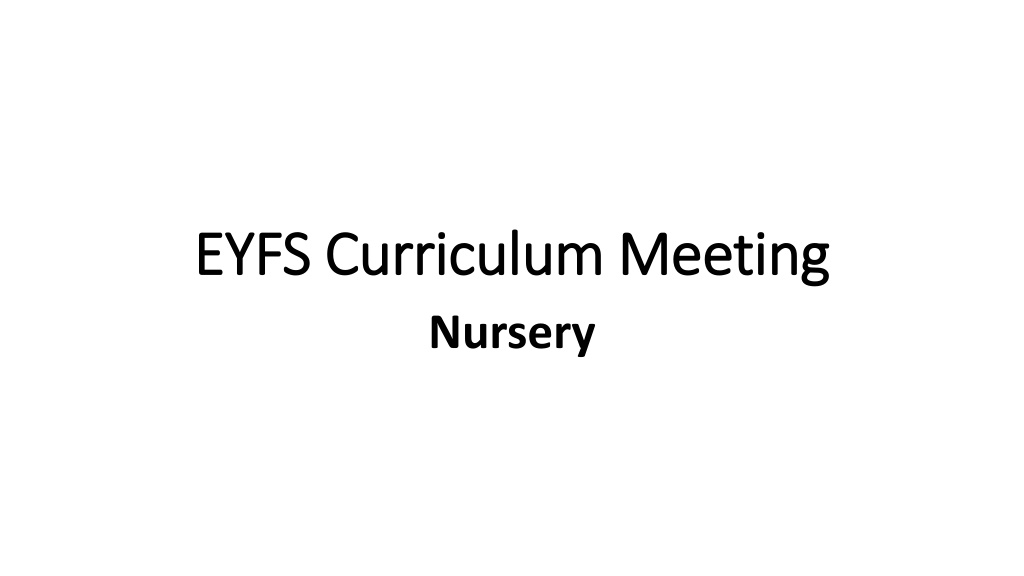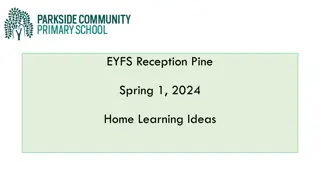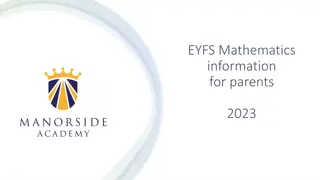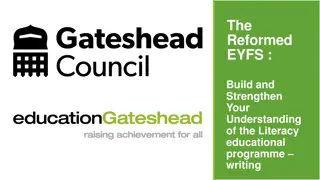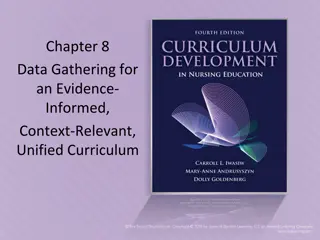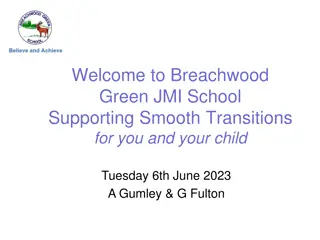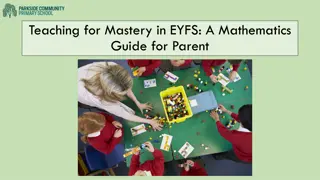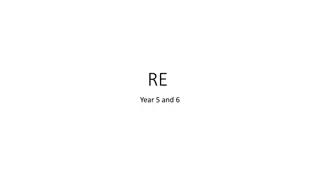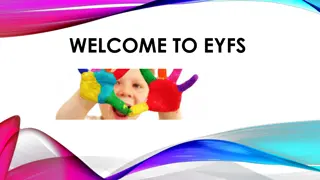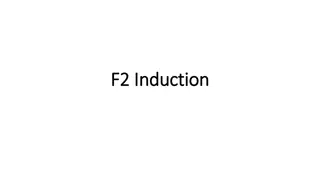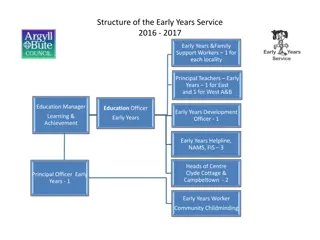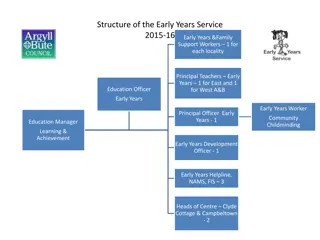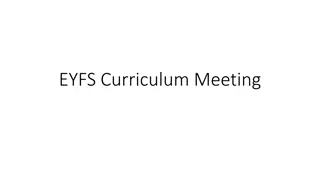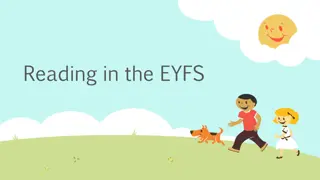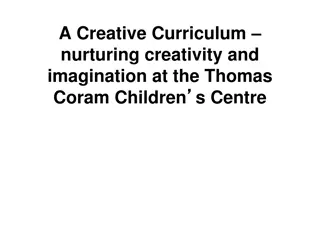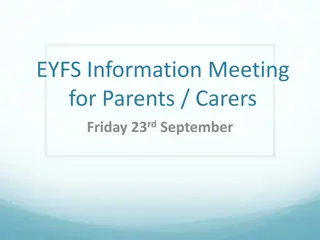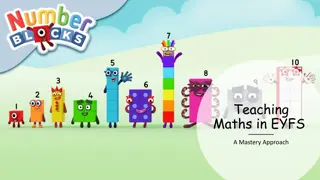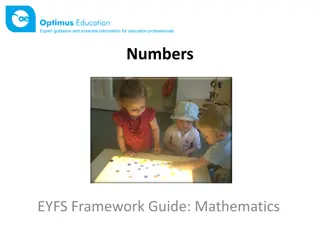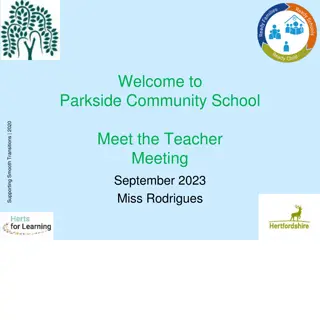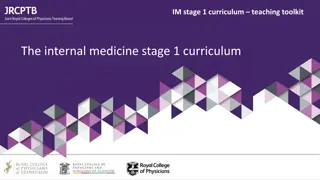Understanding the Early Years Foundation Stage (EYFS) Curriculum
The Early Years Foundation Stage (EYFS) curriculum in the UK is essential for children's learning and development from birth to 5 years old. It focuses on seven key areas, including personal, social, emotional development, physical development, and communication. The curriculum also covers specific areas like literacy, maths, understanding the world, and expressive arts. Through themed activities and responsive teaching, children are encouraged to explore, learn basic skills, and develop progressively in a safe and healthy environment. Phonics schemes like Supersonic Phonics support language development and attention skills.
Uploaded on Sep 09, 2024 | 0 Views
Download Presentation

Please find below an Image/Link to download the presentation.
The content on the website is provided AS IS for your information and personal use only. It may not be sold, licensed, or shared on other websites without obtaining consent from the author. Download presentation by click this link. If you encounter any issues during the download, it is possible that the publisher has removed the file from their server.
E N D
Presentation Transcript
EYFS Curriculum Meeting EYFS Curriculum Meeting Nursery
The Early Years Foundation Stage (EYFS) statutory framework is a government document that all schools and Ofsted-registered early years providers in England must follow. It sets standards for the learning, development and care of your child from birth to 5 years old. The standards ensure your child will learn and develop well and are kept healthy and safe.
What Will My Child Be Learning? The EYFS framework outlines seven areas of learning and development .There are three prime areas of learning, which are particularly important for your child s development and future learning. These are summarised below (see handout). Personal, Social, Emotional Development Physical Development Communication and Language Supports children to develop strength, balance and coordination as well as improve fine motor skills such as drawing and writing with pencils and increasing independence in self- care and dressing. Develops listening and attention, comprehension and vocabulary. Supports children to learn to get on with others and make friends, understand and talk about feelings, learn about right and wrong and ultimately feel good about themselves.
There are four specific areas of learning, through which the prime areas are strengthened and applied: Literacy Maths Encourages children to develop an interest in stories and books and link sounds and letters to begin to read and write. End of Nursery children can hear and say initial sounds, oral blend and write their own name and a few other letters. Develops a child s confidence and ability with numbers 1-5 in Nursery and 1-10 in Reception and encourage an understanding of shapes and measures. End of Nursery children recognise numbers 0,1,2,3,4 and 5, can 1:1 count up to 5 objects, recognise different amounts. Understanding of the World Expressive Arts and Design Guides children to make sense of their physical world and community through opportunities to explore , observe people and places. Develops the children s imagination, creativity and ability to use media and materials.
Autumn 1 Autumn 2 Spring 1 Spring 2 Summer 1 Summer 2 All About Me & My Family People Who Help Us Into The Woods & Celebration Our World and Beyond Food Glorious Food Can We Explore It? In and Around the Sea We deliver our curriculum through a series of themes but also respond to children s interests in order to teach basic skills which are both progressive and embedded in the children s knowledge.
Phonics Scheme Supersonic Phonics Firm Foundations in Nursery Aim develop speaking, listening and attention skills and in Summer Term help the children hear initial sounds in words (first sound) and oral blend eg c-a-t = cat Further information Phonics Meeting 8.11.22 at either 9 am or 3.20 pm cr che in Kenny class
How Will My Child Be Learning? The EYFS framework identifies the essential role of play in your child s development. It is through both child-led play and play guided by an adult that your child will develop confidence and relationships with others. Through play, we will help your child to extend their vocabulary and develop their communication skills. The day is made up of a balance between teacher led teaching inputs, teacher led focussed tasks and child initiated learning in both the indoor and outdoor environments.
A Typical Day In Nursery (when you ask your child what theyve done and they say they can t remember or just played). 9 am - Register and Days of the Week and Weather Songs 9.10 am Scribble Time or Wake Up Shake Up 9.10 9.30 am Maths Teaching Input (whole class on the carpet) 9.30 10.15 am children access indoor/outdoor provision and complete tasks with adults 10.30 am Sit down structured Snack time 10.40 am Phonics Teaching Time (whole class on the carpet) 10.55 11.55 am - children access indoor/outdoor provision and complete tasks with adults 12.00 1.00 pm Lunchtime 1.00 pm Whole Class Tooth brushing followed by Topic Teaching Input 1.00 3.00 pm -children access indoor/outdoor provision and complete tasks with adults/Assembly
How Will I Know How My Child Is Doing? . Tapestry post will inform you a day to day achievements. . Termly Reports will inform you of whether your child is working towards or at the expected level for their age. .Parent Meetings in Autumn and Spring term will provide an opportunity to discuss your child s progress and next steps. .EYFS Profile Your child s Early Years Foundation Stage Profile will be shared with you at the end of the EYFS (Reception). This will inform you of your child s progress and whether they have met or are continuing to work towards their early learning goals (ELGs). There are 17 ELGs your child is expected to achieve by the end of the EYFS.
An easy-to-use and secure online learning journal helping staff and families celebrate their children s learning and development. If you have not yet activated your account or are having problems please speak to a member of staff.
Applying for Reception Class 2023 All children currently in Nursery are due to start in Reception in September 2023. You can apply for a primary school place online anytime from 1 September 2022 to 15 January 2023 11:59pm. Please register or log in via: https://www.bolton.gov.uk/admissions Register on the Citizen Portal to make your application - see user guide. Apply online for a school place. *You can make changes to your application until 15 January 2023 by logging to the Citizen Portal and making your amendments. You must then resubmit your application. Please make sure you receive a confirmation email of these changes. *A link will be sent out next week on Parent App to the Bolton Council admissions page
